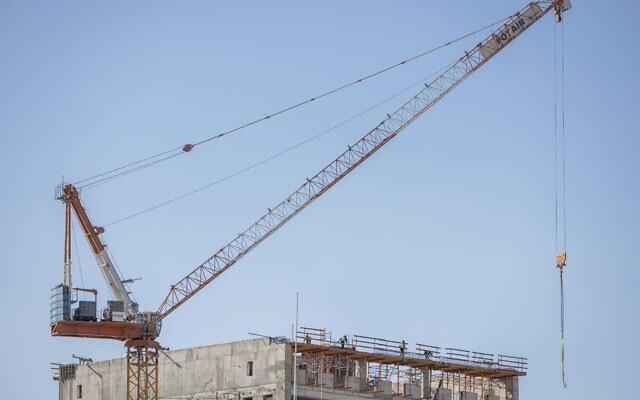Tel Aviv, Jerusalem housing prices fall as mortgage borrowing hits four-year low
Housing market shows a slowdown as prices stabilize; volume of real estate transactions down 39% year-on-year
After a period of sharper increases, housing prices rose by just 0.1 percent from December 2022 to January 2023, taking year-on-year inflation in the market to 14.6% compared to the same period in December 2021 to January 2022, according to new figures released this week by the Central Bureau of Statistics (CBS).
In September-October 2022, the annual rise from the same period in 2021 was calculated at 20.3%, among the sharpest increases for house prices.
But between October 2022 and January 2023, home prices rose by a total of just 0.5%, according to CBS’ most recent report. An actual fall in housing prices was recorded in the high-demand areas of Tel Aviv (- 0.5%) and Jerusalem (- 1.1%) as well as Haifa (- 0.9%), according to the report. Price increases of 1.3% were noted in central Israel, outside the Tel Aviv area.
This stabilization has coincided with a sharp drop in real estate transactions compared to last year and a consistent decrease in mortgage borrowing, according to separate reports by the Finance Ministry’s Chief Economist and the Bank of Israel, also released this week.
In January, just 7,093 homes changed hands, a reduction of 39% year-on-year and the lowest volume for the month of January since 2009, according to the Finance Ministry report, which said the drop in transactions was on par with decreases seen since April 2022 when the central bank began hiking the benchmark interest rate.
With prime interest rates now at 4.25% (as of February), the cost of borrowing is up as interest on home loans is typically somewhere between 5.5% and 6.5%. Controls on housing loans limit the amount of monthly household income that can be committed to mortgage payments (to no more than a third of expenses), again reducing the amount that can be borrowed.
Sharp price increases in recent years have risen much faster than wages, and potential buyers have also been facing reduced affordability.
According to the central bank, mortgage loans hit a four-year low in February 2023, with homeowners borrowing about NIS 5.7 billion ($1.57 billion) for the month, down almost 50 percent from February 2022 (with some NIS 11 billion or $3 billion in mortgage loans). The figure was also significantly lower than January’s mortgage loan numbers, with NIS 6.4 billion ($1.75 billion) borrowed for homes.
The last time mortgage borrowing stood at roughly NIS 5 billion (excluding the early pandemic period of April-May 2020 when the housing market was hit hard) was the last few months of 2019, according to bank figures.
The Finance Ministry’s report showed that while housing prices appeared to be stabilizing, the cost of new apartments appears to be falling more rapidly than prices for second-hand apartments
Developers are seeing a sharp fall in sales across the country, with only sales promotions on new development in Haifa suburb Kiryat Bialik bucking the trend, where the average price for an apartment is NIS 1,570,000 (about $430,000). Despite extensive ongoing development in Tel Aviv, just 141 new apartments were sold there in January.
In the past, reductions in the volume of home sales have been attributed to a decline in the purchase of investment properties — where a household already owns a different home that they live in, or else the buyer lives overseas. Investor purchases in January were down 18% compared to January 2022, but the current numbers also show a reduced number of first-time buyers, and of those trying to move up the housing ladder by buying bigger homes or dwellings in more desired areas (down 42% year-on-year).
To date, there is little evidence that the price of houses sold is falling: Instead, the rate of increase is tapering off with the result that house prices are no longer rising sharply month-on-month.
The combination of data released this week suggests that sellers are waiting for a buyer to meet the price they have set, rather than settling on a lower value, and that there is an underlying belief in the market that prices will start to rise again soon. But if the number of transactions does not start to rise, it is possible that developers will come under cash-flow pressure and start to accept a lower profit margin in exchange for realizing their investments.










